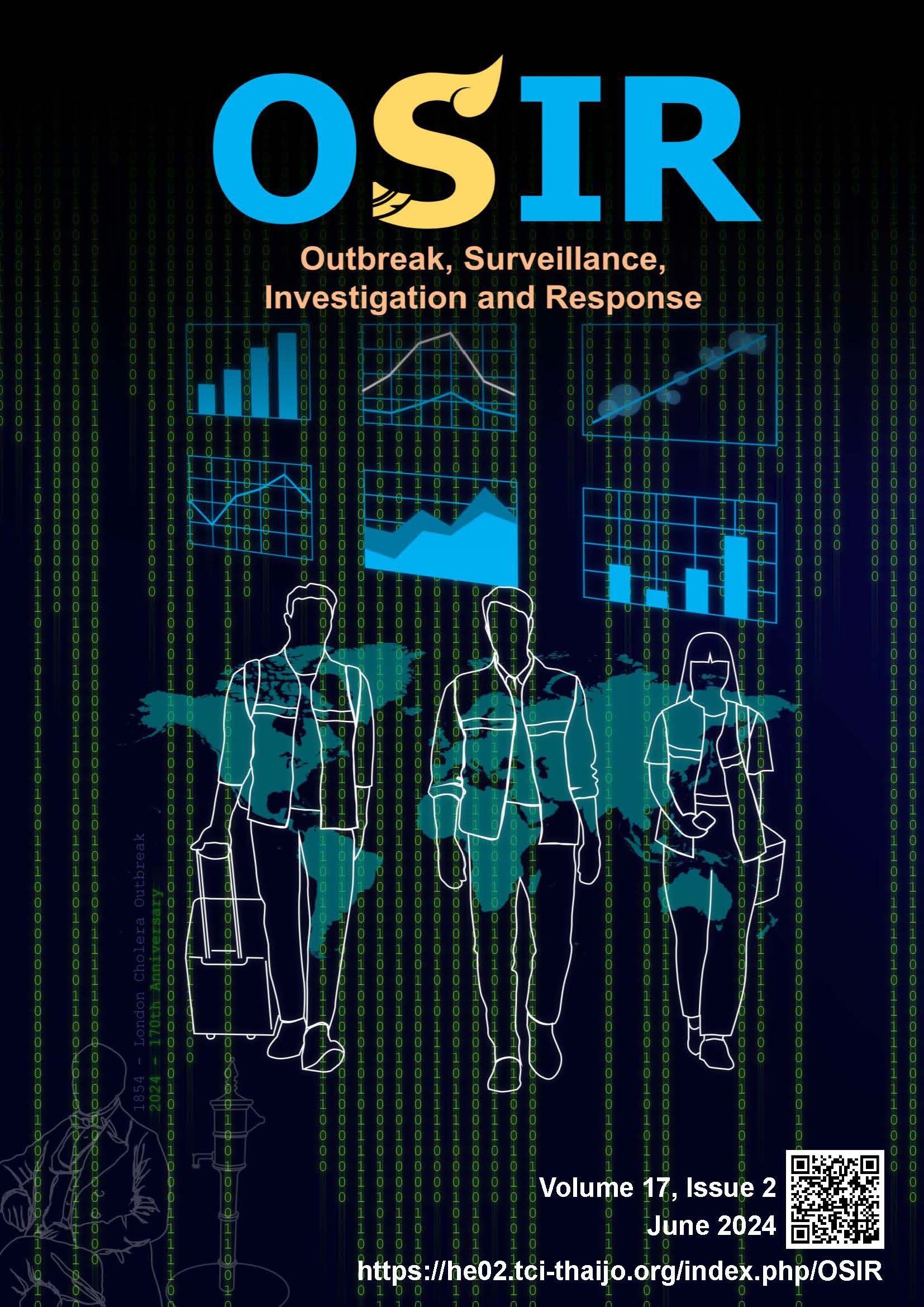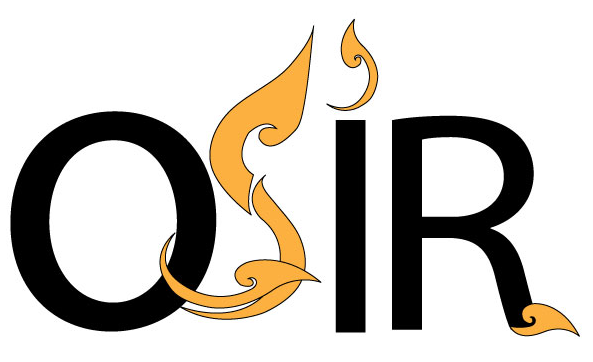An Investigation of Food Poisoning Outbreak among Meeting Attendees in Pattaya City, Thailand, following Post-pandemic Kitchen Reopening, August 2022
DOI:
https://doi.org/10.59096/osir.v17i2.268235Keywords:
Bacillus cereus, food poisoning, outbreak, Pattaya City, ThailandAbstract
On 9 Aug 2022, meeting attendees at Hotel B in Pattaya City developed gastrointestinal symptoms during a tourism reopening after Thailand had transitioned to the post-COVID-19 phase. We investigated to confirm the diagnosis, describe outbreak characteristics, identify possible sources and risk factors of the outbreak, and provide recommendations. A food poisoning case was an individual staying in Hotel B on 8–9 Aug 2022 and experienced at least one of the following symptoms: diarrhea, nausea, vomiting and abdominal pain. We sent a self-administered questionnaire to all attendees and interviewed the cases. Food preparation and processing were examined. We swabbed kitchenware and food handlers’ hands and collected water samples for bacterial culture. We conducted a retrospective cohort study and used Poisson regression with a robust standard error model. Fifty-five percent of the attendees responded to the questionnaire; the attack rate was 34%. Common symptoms were diarrhea (100%) and abdominal pain (80%). The median incubation period was 7–13 hours. Stewed pork leg with kale had the highest adjusted risk ratio of 27.82x106 (95% CI 9.06x106–85.44x106). It was reported as cold with an unusual smell and taste. We found Bacillus cereus and Aeromonas spp. on kitchenware and in filtered water. The incubation period, symptoms, and laboratory results suggested that Bacillus cereus was the most likely pathogen from the stewed pork leg. We recommended sanitizing the kitchen and kitchenware, promoting food sanitary awareness, and ensuring the quality of water supply system, particularly for hotels preparing to reopen after prolonged closure.
References
World Health Organization. Estimating the burden of foodborne disease [Internet]. Geneva: World Health Organization; 2022 [cited 2022 Sep 5]. <https://www.who.int/activities/estimating-the-burden-of-foodborne-diseases>
Bureau of Epidemiology, Department of Disease Control, Ministry of Public Health. Food Poisoning disease surveillance data (R506) [Internet]. Nonthaburi: Bureau of Epidemiology: 2022 Aug [cited 2022 Sep 5]. 1 p. <http://doe.moph.go.th/surdata/506wk/y65/d03_3265.pdf>. Thai.
Sansilapin C, editor. Food Poisoning. In: Annual epidemiological surveillance report 2020 [Internet]. Nonthaburi: Division of epidemiology, Department of Disease Control, Ministry of Public Health (TH); [cited 2022 Sep 13]. p. 195–7. <https://apps-doe.moph.go.th/boeeng/download/AW_AESR_2563_MIX.pdf>. Thai.
Chancharat S, Meeprom S. The effect of the COVID-19 outbreak on hospitality and tourism stock returns in Thailand. Anatolia. 2022;33(4): 564–75. doi:10.1080/13032917.2021.1982738.
Tripattanasit P, Kobkanjanapued Y, Suksanguan W, Chotkunakitti P. The Effect of COVID–19 pandemic crisis on financial risk of hotels and resorts in Thailand. Journal of Arts Management. 2022;6(4):2186–207.
Prapasa W, Dokchan P. Impact of Covid-19 to the hotel business. Interdisciplinary Academic and Research Journal. 2022;2(5):345–58. doi:10.14456/iarj.2022.100.
Hawaree T, Povathong B. Adaptation Strategies for Survival from COVID-19 Crisis of Small and Medium-sized Independent Hotels in Northern Area of Pattaya during 2020–2021. Sarasatr. 2022;5(2):219–32.
Covid-19: as of July 1st, Thailand enters the post-pandemic phase. What has changed? [Internet]. Bangkok: BBC News Thai: 2022 Jul 1 [cited 2023 Dec 7]. <https://www.bbc.com/thai/thailand-62005878>. Thai.
The centre for COVID-19 situation administration (CCSA) has resolved the nationwide COVID-19 control measures [Internet]. Bangkok: Workpoint today; 2022 Jun 17 [cited 2023 Dec 7]. <https://workpointtoday.com/covid19-545/> Thai.
Wang Y, Zhang S, Yu J, Zhang H, Yuan Z, Sun Y, et al. An outbreak of Proteus mirabilis food poisoning associated with eating stewed pork balls in brown sauce, Beijing [Internet]. Food Control. 2010 Mar;21(3):302–5. doi:10.1016/j.foodcont.2009.06.009.
Srisangkham T, Kongsuk W, Makant W, Prommee N, Tapaniyakul N, inventor; Department of Health, Ministry of Public Health, assignee. A simple medium for coliform detection. Thailand petty patent TH 1846. 2005 Jun 14. Thai.
Tapaniyakul N, Prommee N, Makant W, Kongsuk W, inventor; Department of Health, Ministry of Public Health, assignee. A residual chlorine test kit. Thailand petty patent TH 1264. 2004 Feb 19. Thai.
Institute of Health Systems. Introduction to chlorine residual testing [Internet]. Hyderabad: Institute of Health System; [cited 2024 Jun 14]. <https://www.ihs.org.in/lab/chemlab/crtintro.html>
Wickham H, Averick M, Bryan J, Chang W, McGowan L, Francois R, et al. Welcome to the tidyverse. Journal of Open Source Software. 2019;4(43): 1686. doi:10.21105/joss.01686.
Rattanathamsakul T, editor. Summary of event-based surveillance. In: Annual epidemiological surveillance report 2020 [Internet]. Nonthaburi: Division of Epidemiology, Department of Disease Control, Ministry of Public Health (TH); [cited 2022 Sep 13]. p. 226. <https://apps-doe.moph.go.th/boeeng/download/AW_AESR_2563_MIX.pdf>. Thai.
Stendors Arnesen LP, Fagerlund A, Granum PE. From soil to gut: Bacillus cereus and its food poisoning toxins. FEMS Microbiol Rev. 2008;32(4):579–606. doi:10.1111/j.1574-6976.2008.00112.x.
Schneider KR, Schneider RG, Silverberg R, Kurdmongkoltham P, Bertoldi B. Preventing foodborne illness: Bacillus cereus: FSHN15-06/FS269, Rev. 4/2017 [Internet]. EDIS. 2017 May 9 [cited 2022 Sep 9];2017(2):6. p. 6, doi:10.32473/edis-fs269-2017.
Pessoa RBG, de Oliveira WF, Correia MTDS, Fontes A, Coelho LCBB. Aeromonas and human health disorders: clinical approaches. Front Microbiol. 2022 May 31;13:868890. doi:10.3389/fmicb.2022.868890.
Pathogen Regulation Directorate, Public Health Agency of Canada. Pathogen safety data sheets: infectious substances–Aeromonas hydrophila [Internet]. Ottawa (ON): Public Health Agency of Canada; 2011 [cited 2022 Sep 15]. <https://www.canada.ca/en/public-health/services/laboratory-biosafety-biosecurity/pathogen-safety-data-sheets-risk-assessment/aeromonas-hydrophila.html>
Vila J, Ruiz J, Gallardo F, Vargas M, Soler L, Figueras MJ, et al. Aeromonas spp. and traveler’s diarrhea: clinical features and antimicrobial resistance. Emerg Infect Dis. 2003 May;9(5):552–5. doi:10.3201/eid0905.020451.
Preston City Council. Re-opening food businesses following prolonged closures. [Internet]. Preston: Preston City Council; 2022 [cited 2023 Dec 15]. <https://www.preston.gov.uk/article/2399/Re-opening-Food-Businesses-following-Prolonged-Closures>
National Center for Immunization and Respiratory Diseases; National Center for Environmental Health. Reopening buildings after prolonged shutdown or reduced operation. [Internet]. Atlanta: Center for Disease Control and Prevention (US); 2021 [cited 2023 Dec 15]. <https://www.cdc.gov/nceh/ehs/water/legionella/building-water-system.html>
Downloads
Published
How to Cite
Issue
Section
License
Copyright (c) 2024 Outbreak, Surveillance, Investigation & Response (OSIR) Journal

This work is licensed under a Creative Commons Attribution-NonCommercial-NoDerivatives 4.0 International License.









